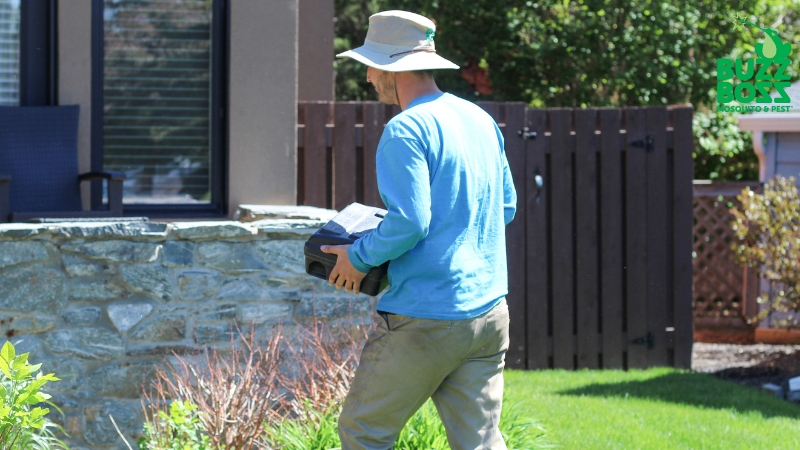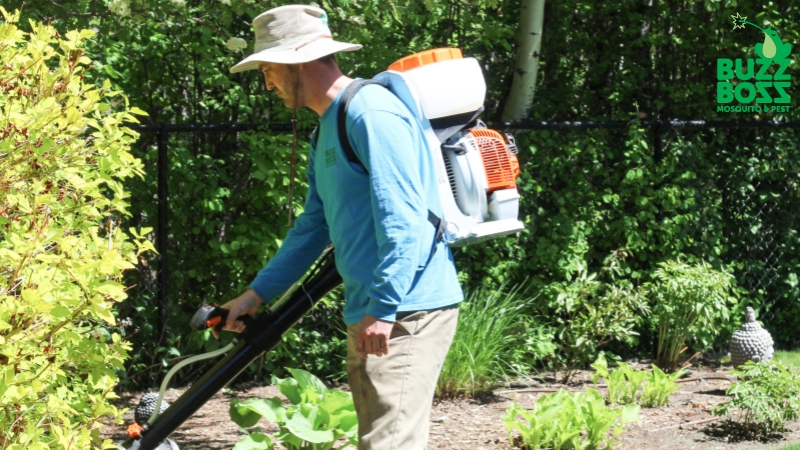Pests That Will Be Plaguing Your Saskatoon Yard & Garden
Reading time: 8 minutesSpring and summer may bring beautiful weather to Saskatoon, but they also bring more pests and wild animals to your yard and garden. Depending on what kind of pest you’re dealing with, they might be more than just a nuisance – you could be at risk of a painful bite or serious disease.
We go over 9 pests that the city residents should keep an eye out for and how the qualified pest control professionals at Buzz Boss can help you stay pest-free all year long!

Top 9 Pests to Watch Out For If You Live in Saskatoon
When temperatures warm up between April and October, many kinds of pests will emerge from their winter slumbers. Here are the top 9 you're most likely to see and how to get rid of them with the help of our qualified exterminators in Saskatoon.
1. Mosquitoes
Mosquitoes can do far more than just cause an itchy, uncomfortable bite. Many mosquitoes carry dangerous viruses that can be spread to humans through their bite, and some of these illnesses have long-lasting impacts. They may even be fatal, like malaria, West Nile Virus, and Dengue Fever.
The City of Saskatoon runs a program designed to control mosquitoes during their larval stage. It involves treating small bodies of standing water with larvicide before the larvae can develop into biting adults.
2. Yellowjackets
Stinging insects like yellowjackets, wasps, and hornets can be a serious issue in the late summer, especially if there’s a nest nearby. Yellowjackets, in particular, tend to be more aggressive than other types of stinging insects and can sting multiple times without losing their stinger. They can also bite, causing several painful wounds at once.
If you live on city property, you can contact Saskatoon officials to have a wasp or hornet nest removed from the property. However, city officials will not remove nests on private property or that are out of the reach of a standard stepladder. You’ll have to call in wasp and hornet pest control for that.

3. Voles
Voles are often mistaken for field mice, but they cause significantly more damage below ground than common mice or rats. This is because they create tunnels underground that weaken the soil and damage delicate plant roots. A vole infestation can be disastrous for properties with fruit trees or vegetable gardens.
4. Ants
While ants do help maintain healthy soil, they can also cause damage to roots, plant stalks, and leaves. Ants also promote the growth of aphids, which can be even more destructive to vegetable gardens, fruit trees, flowers, or other ornamental plants.
Some ant species, like Pharaoh and carpenter ants, are also health hazards and can cause structural damage to your home. Others bite or sting, like fire ants. If you see ants in your yard or garden, it’s important to know what kind of ant it is and if it’s beneficial or harmful for plants, animals, and people nearby.
5. Spiders
Most spiders are harmless and play a critical role in maintaining environmental health. That said, a few spiders are venomous and pose a threat primarily to children, pets, and older adults. Because it gets so cold in Canada, widow spiders are the only ones you might need to worry about. Black widows, in particular, are often found under large rocks, porches, boxes, and sheds, or the backs of closets.
Even though the vast majority of spiders aren’t problematic, most Saskatoon homeowners don’t want them around. But unfortunately, traditional pesticides usually don’t work for spiders. This is because their unique legs allow them to keep their bodies off the ground, leaving very little that comes into contact with liquid or powder insecticides. And due to the way spiders hunt with their webs, bait generally doesn’t work well either.
6. Ticks
There are dozens of tick species across Canada, only 2 of which can carry Lyme disease. Despite the low number of ticks that spread this infectious bacteria, people are still at serious risk, especially if they spend a lot of time outdoors in the spring, summer, and fall seasons. Ticks are usually infected with the Borrelia burgdorferi bacterium that causes Lyme disease when ingesting a blood meal from an affected animal, such as birds, rats, mice, and deer.
While taking protective measures against ticks when engaging in activities like hiking or camping is important, you might want to avoid doing this in your backyard. Tick control treatments can be applied by pest control professionals to create a barrier that keeps ticks away from your home.
7. Aphids
Aphids are one of the most common garden pests, and, like some insects, low numbers of them usually aren't a problem. However, this changes when plants are overrun, and aphids begin to cause structural damage as they chew through the stems and leaves.
Like most insects, though, aphids aren't too fond of aromatic plants like rosemary, thyme, cilantro, and citronella. Marigolds also do a good job of repelling aphids and can make great companions to vegetable plants in your garden.
8. Boxelder Beetles
While boxelder bugs generally don't bite or pose any harm to humans, they can be a nuisance when it comes to your home and garden. This is especially true if you have box elder trees, which are this insect's primary food source. However, only female trees produce seed pods, so you're less likely to see them on male trees. If food sources are scarce, box elder bugs may also feed on the sap of fruit, maple, and ash trees.
9. Rodents
Rats and mice have long been a problem for Saskatoon homeowners since these furry-but-dangerous creatures carry serious diseases like salmonella, leptospirosis, and Hantavirus. If not promptly treated, these illnesses can cause critical complications and potentially even become fatal. Eliminating entry points for rodents is one key step in keeping them away from your home.

Frequently Asked Questions (FAQs) About Pest Control in Saskatoon
Are all insects in Saskatoon harmful?
Not all insects you may find in your yard or garden in Saskatoon are harmful to your plants. Some are beneficial, especially in controlled populations. Bees, for example, are pollinators that help flowers and plants reproduce. They also produce honey, which has multiple health benefits when eaten. Lacewing larvae are also helpful since they primarily feed on aphids.
That said, too much of a good thing can sometimes be bad, particularly when it comes to pests. Any insect you see too many of may be an infestation, and steps should be taken to reduce or eliminate large populations of almost any type of insect.
How do I know if I need pest control services?
With so many kinds of pests in Saskatoon, it can be challenging to know if you have a problem. Here are some telltale signs that you should call a professional exterminator:
- You see pest droppings throughout your home. Look for evidence of scat inside drawers, cabinets, crawlspaces, and in your attic or basement. A professional can examine the droppings to determine what kind of pest you have and what treatment will be the most effective.
- You hear strange sounds when your house is quiet. This includes things like scratching, squeaking, scurrying, or tapping. These sounds potentially indicate rodent, termite, or carpenter ant infestations.
- You see ladybugs in or around your home. Ladybugs and Asian beetles swarm in the spring and feed mainly on aphids. While seemingly sweet, these insects are aggressive and can emit a foul odour when squished. If you see red or orange-ish ladybugs around, there's a good chance you're also dealing with aphids or another kind of pest.
Other indicators that you need professional pest control are chewed wires, holes in your clothes or bedding, unpleasant odours, and small piles of sawdust around your doors or window sills.
Do Saskatoon pest control companies use safe pesticides?
Which pesticides and other control measures your pest control professional will take depends on several factors, including the type of pest you have and the severity of the problem.
Buzz Boss uses Integrated Pest Management (IPM) strategies, which aim to reduce the negative impact that pest control measures can have on the surrounding environment without losing efficacy. These methods include habitat manipulation, biological controls, cultural practices, and other methods designed to work with the ecosystem rather than against it to achieve the desired outcome.

Got Pests? Call the Qualified Saskatoon Exterminators at Buzz Boss Today
If you’re dealing with a pest problem, we can help. Our Saskatoon exterminators have experience identifying and eradicating multiple types of pest infestations and can help you determine what kind of pests you have and how best to get rid of them.
We use Integrated Pest Management (IPM) methods to minimize potential harm to people and the environment without sacrificing efficacy.
Buzz Boss also offers reliable pest control services to the following areas across Western Canada:

